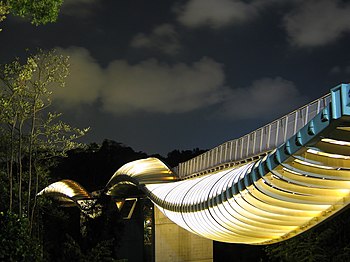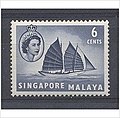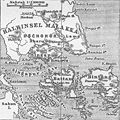Portal:Singapore
 Map of Singapore Singapore, officially the Republic of Singapore, is an island country and city-state in Southeast Asia. The country's territory comprises one main island, 63 satellite islands and islets, and one outlying islet. It is about one degree of latitude (137 kilometres or 85 miles) north of the equator, off the southern tip of the Malay Peninsula, bordering the Strait of Malacca to the west, the Singapore Strait to the south along with the Riau Islands in Indonesia, the South China Sea to the east, and the Straits of Johor along with the State of Johor in Malaysia to the north.
In its early history, Singapore was a maritime emporium known as Temasek and subsequently a major constituent part of several successive thalassocratic empires. Its contemporary era began in 1819, when Stamford Raffles established Singapore as an entrepôt trading post of the British Empire. In 1867, Singapore came under the direct control of Britain as part of the Straits Settlements. During World War II, Singapore was occupied by Japan in 1942 and returned to British control as a Crown colony following Japan's surrender in 1945. Singapore gained self-governance in 1959 and, in 1963, became part of the new federation of Malaysia, alongside Malaya, North Borneo, and Sarawak. Ideological differences led to Singapore's expulsion from the federation two years later; Singapore became an independent sovereign country in 1965. After early years of turbulence and despite lacking natural resources and a hinterland, the nation rapidly developed to become one of the Four Asian Tigers. As a highly developed country, it has one of the highest PPP-adjusted GDP per capita. It is also identified as a tax haven. Singapore is the only country in Asia with a AAA sovereign credit rating from all major rating agencies. It is a major aviation, financial, and maritime shipping hub and has consistently been ranked as one of the most expensive cities to live in for expatriates and foreign workers. Singapore ranks highly in key social indicators: education, healthcare, quality of life, personal safety, infrastructure, and housing, with a home-ownership rate of 88 percent. Singaporeans enjoy one of the longest life expectancies, fastest Internet connection speeds, lowest infant mortality rates, and lowest levels of corruption in the world. It has the third highest population density of any country, although there are numerous green and recreational spaces as a result of urban planning. With a multicultural population and in recognition of the cultural identities of the major ethnic groups within the nation, Singapore has four official languages: English, Malay, Mandarin, and Tamil. English is the common language, with exclusive use in numerous public services. Multi-racialism is enshrined in the constitution and continues to shape national policies. Singapore is a parliamentary republic and its legal system is based on common law. While the country is de jure a multi-party democracy with free elections, the government under the People's Action Party (PAP) wields widespread control and political dominance. One of the five founding members of ASEAN, Singapore is also the headquarters of the Asia-Pacific Economic Cooperation Secretariat, the Pacific Economic Cooperation Council Secretariat, and is the host city of many international conferences and events. Singapore is also a member of the United Nations, the World Trade Organization, the East Asia Summit, the Non-Aligned Movement, and the Commonwealth of Nations. (Full article...)Selected article -The Speakers' Corner in Singapore is an area located within Hong Lim Park at the Downtown Core district, where Singaporeans may demonstrate, hold exhibitions and performances, as well as being able to engage freely in political open-air public speeches, debates and discussions. As a free speech zone, it is based upon the premise of its namesake, Speakers' Corner, which was first launched at Hyde Park in London and has since been established in many other countries with a political system of representative democracy. Launched in 2000, it aims to address the genuine desire by some Singaporeans for lawful outdoor demonstrations and processions as a means of further political expression, without disrupting or hindering the productivity of the country as a whole. Singaporeans are also entitled to organise or participate in demonstrations at the Speakers' Corner without having to obtain a police permit. (Full article...) Selected picture Henderson Waves, a 274-metre (900-foot) long pedestrian bridge connecting Mount Faber Park and Telok Blangah Hill Park. At 36 metres (120 feet) above Henderson Road, it is the highest pedestrian bridge in Singapore. Read more... General imagesThe following are images from various Singapore-related articles on Wikipedia.
Selected biography -Choor Singh Sidhu (19 January 1911 – 31 March 2009), known professionally as Choor Singh, was a Singaporean lawyer who served as a judge of the Supreme Court of Singapore and, particularly after his retirement from the bench, a philanthropist and writer of books about Sikhism. Born to a family of modest means in Punjab, India, he came to Singapore at four years of age. He completed his secondary education in the top class at Raffles Institution in 1929, then worked as a clerk in a law firm before becoming a civil servant in the Official Assignee's office. Encouraged by the Assistant Official Assignee, James Walter Davy Ambrose (who was later appointed a High Court Judge), to study law, Choor Singh enrolled as an external student at the University of London, passing the matriculation examination and intermediate LL.B. examination. In 1948 he was appointed a coroner, and the following year was elevated to the post of magistrate, becoming the first Indian to hold such a position in colonial Malaya. Following law studies at Gray's Inn on a government scholarship, he became a Barrister-at-Law in 1955. He was appointed a district judge in 1960 and a judge of the Supreme Court in 1963. Especially noted for his criminal judgments, Singh was the first Singapore judge to impose the death penalty on a woman. (Full article...) Did you know (auto-generated)
In this month
More did you know -
Selected panoramaA view of Gardens by the Bay (Chinese: 滨海湾花园; pinyin: bīnhǎi wān huāyuán), a park spanning 101 hectares (250 acres) of reclaimed land in central Singapore. The Conservatories and Supertrees are visible, as is the Singapore Flyer in the background. Singapore topicsRelated portalsSoutheast Asia Other Countries Tasks
CategoriesWikiprojectsAssociated WikimediaThe following Wikimedia Foundation sister projects provide more on this subject:
Discover Wikipedia using portals |































































